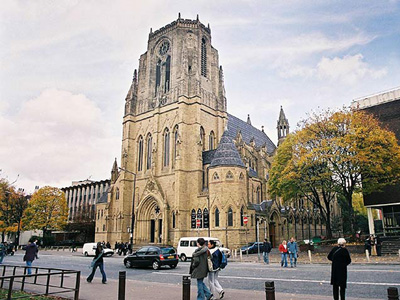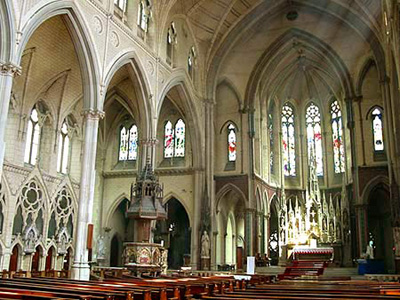 |
||||||||||
 |
||||||||||
|
1403: Holy Name of Jesus, Manchester, England Mystery Worshipper: Og the King of Bashan and his most learned Queen. The church: Holy Name of Jesus, Oxford Road, Manchester, England. Denomination: Roman Catholic. Founded by Jesuits, the church is now staffed by the Oratorians (Oratory of St Philip Neri). The building: An enormous neo-Gothic pile dating from the 1870s, made out of yellowish-grey stone, with graceful flying buttresses around the apse. The architect was Joseph Aloysius Hansom, who also designed the cab that bears his name. There's a rather squat west tower that dates from 1928, designed by the brothers Giles and Adrian Gilbert Scott. The interior is wide, with a range of beautifully-traceried chapels and confessionals lining the aisles. Despite a splendidly carved pulpit, the high altar is the focus of everything – an elevated riot of crocketed pinnacles and spires. One does not, however, get a mere glimpse of the altar through a rood screen at the end of a long chancel – the Jesuits who built Holy Name wanted the congregation to get close to the altar, and so the sanctuary is quite short. The church: Holy Name appears to be something of an orphan. The Jesuits turned it over to the diocese of Salford in 1992, pleading dwindling vocations and high maintenance costs. The diocese in turn enlisted the aid of the Oratory of St Philip Neri to administer the church. So fas as I could tell, the present arrangement seems to be that the church is staffed by Oratorian priests but operates in partnership with the diocese as part of a compromise to ensure minimum disruption to the church's life when the Jesuits left. Holy Name appears to play a prominent role in the life of Manchester University, with the Catholic chaplaincy situated next door. They do manage to celebrate three masses each Sunday, with the last being a Latin Tridentine mass, and two masses each weekday save for Saturdays, when there is only one. Benediction of the Most Blessed Sacrament is also given each weekday. The neighbourhood: This section of Manchester's Oxford Road is right in the middle of the university campus; there's a mixture of academic Gothic and Modernism, interspersed with general urban decay. There seemed to be quite a few students milling around, despite the bleak midwinter outside! The cast: A Father Christopher (I didn't catch his surname – sorry!) was the celebrant and preacher. The date & time: Sunday, 10 December 2006, 4.00pm. What was the name of the service? Latin Tridentine Mass. How full was the building? When we arrived there were only about 25 people there, but it filled up a lot at the back. At the end, we counted about 70. It was a big church – capacity of 400 to 500 – but it was the third mass of the day, and in Latin! The congregation represented a good mix of ages and both sexes, but no children. Did anyone welcome you personally? As we walked in, we were greeted by a gentleman with a rather disturbingly gruff voice – but he turned out to be extremely friendly! He also kindly gave the Queen directions to the toilet – which were needed, since it was disguised as a confessional. She had no desire for her first confession to be, "Bless me, Father, for I have sinned, but I thought this was the loo!" Was your pew comfortable? A good solid Victorian wooden bumfreezer. Sadly, it wasn't designed for the typical "Anglican crouch" kneeling posture, and so the King had to kneel, all proper and contrite-like. How would you describe the pre-service atmosphere? Quiet, but not especially prayerful. The windows darkened as the evening drew on, the wind blew outside, and the temperature started to drop in the church. People continued to file into the pews at the back of the church, but didn't chatter. Since the service didn't really begin in the normal way, this was more or less the atmosphere throughout. What were the exact opening words of the service? A noise arose from the right side of the sanctuary that sounded something like: "Introboadltdei: Delfictiuvmmum." We assumed that it was probably: "Introibo ad altare Dei: ad Deum qui laetificat iuventutem meum" ("I will go in to the altar of God: to God who gives joy to my youth"), which is the opening sentence of the Tridentine mass. However, the words were spoken with great haste, very quietly, and with a sad lack of joy, youth or indeed consonants. What books did the congregation use during the service? Just a leaflet with both the ordinary and proper of the day's mass printed in Latin and English, so we could follow the service. Thankfully. What musical instruments were played? There was no music, not even hymns or psalms. I am told that they are proud of their choir, which is said to be one of the few in Manchester to favour polyphonic repertoire. Did anything distract you? The Queen kept wondering whether the sleeves of Father Christopher's alb were decorated with lace or embroidered – but then again, we had plenty of time for idle speculation! Was the worship stiff-upper-lip, happy clappy, or what? The highest, driest, most stereotypically old-RC service imaginable! The responses were said only by the acolytes, with the priest and altar party showing no sign of having noticed the congregation at all. The entire liturgy – including the lessons for the day – were addressed to the altar, and in rather hurried Latin. Luckily the lessons were read with better enunciation than the opening sentence – indeed, they seemed to the King to be admirably precise. But the speed, oh, the speed! The sotto voce delivery! The fact that in one of the few places in the north of England where one might hear Latin read well, they seemed rather embarrassed about the fact and tried to get through all the liturgy of the Word as quickly as they could.  Exactly how long was the sermon? 15 minutes. On a scale of 1-10, how good was the preacher? 8 – Once Father Christopher donned his biretta and ascended the pulpit, his speaking voice morphed into one that was strong and engaging. It was extraordinarily different from the hushed rattle of Latin that had preceded it. He preached a very good sermon, with just enough self-mocking and humour to keep everyone's attention, whilst dealing with a quite troublesome theological theme. In a nutshell, what was the sermon about? He began with a very literal account of the miracles of the shrine known as the Little House at Loreto – which apparently was the house where the Blessed Virgin was born, where she was visited by the angel Gabriel, where Jesus was conceived, and where the Holy Family lived during Jesus' formative years. The emperor Constantine built a basilica over the house in 312, which protected it from the ravages of the Turks. But in 1294 the house was suddenly and mysteriously whisked away by angels who transported it from Palestine to Loreto, Italy, with an apparent brief stopover in what was to become Yugoslavia. (This initially made us a little uncomfortable, but he did offer various pieces of evidence to convince even the most skeptical listener.) However, he then went on to talk about the centrality of the house to the Oratorian life – among the thousands of saintly folk making pilgrimage to the house over the years was St Philip Neri himself, as well as one of St Philip's disciples, a monk named Antonio Grassi. Whilst praying there, Father Grassi was struck by lightning, an event which he survived, and in thanksgiving donated his scorched underwear to the shrine! Just when it seemed that the sermon had departed from reality, Father Christopher suddenly got to the point. And a very good point it was, too, made forcefully and memorably: that God in his Incarnation sanctifies all human life, not just the pretty or the polite bits. Which part of the service was like being in heaven? Despite being confused by the silence, the Queen felt the elevation was certainly very solemn, with much ringing of bells. She was impressed that the bell ringer managed to time it right given that the prayer of consecration lacked audible words. On the other hand, the King felt the glorious moment when the first whiff of incense hit him as he walked in through the door was particularly heavenly – if only they'd used some in the actual service! And which part was like being in... er... the other place? The bizarrely hurried and offhand way in which some of the liturgy was carried out – in particular, the mad rush up to the communion rail. It bore a certain resemblance to the queue for the pudding in my primary school dining hall. What happened when you hung around after the service looking lost? We wandered around and looked into the beautiful side chapels, where the King was frightened by a Very Pious Catholic Lady who obviously wanted to do some hard praying. The man who had welcomed us in gave us a friendly, if gravelly, valediction; but by then it was pitch dark outside and the church was being locked up. How would you describe the after-service coffee? No coffee – as this wasn't their main Sunday service, it seems a little unfair to judge them harshly for that. How would you feel about making this church your regular (where 10 = ecstatic, 0 = terminal)? 6 – From the Queen's point of view, it was so dissimilar from anything she'd seen before that she found it hard to say from one visit. The King, however, noted that it is such a beautiful building and wouldn't mind coming back to a main Sunday service, which we gather is a sung Latin novus ordo mass. If we were to come again to the Tridentine mass, we should probably procure a copy of the Lay Folks Mass Book (a mediaeval book of meditations to be used whilst attending mass) and regard the mass as a time of meditation rather than a normal service. Did the service make you feel glad to be a Christian? The King was intrigued by the service and felt glad of the opportunity to have some silent sacred space. The Queen is not a Christian. What one thing will you remember about all this in seven days' time? The King will remember the fastest Latin he's ever heard. The Queen will remember the toilet disguised as a confessional! |
|
|
||||||||||||||||||||||||||||||||||||
| More Mystery Worshipper reports | |||||||||||||||||||||||||||||||||||||||
 |
|||||||||||||||||||||||||||||||||||||||






